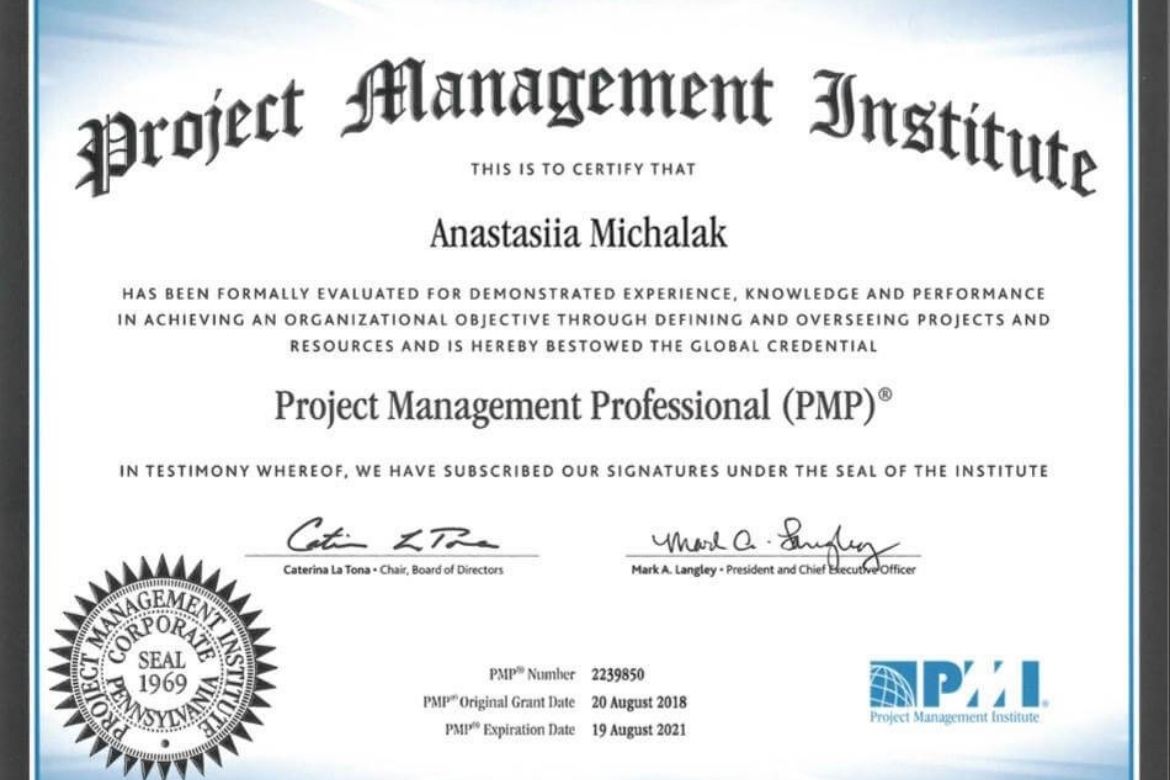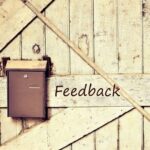Each of you would like to find the fastest and easiest way to prepare and pass the PMP exam. We keep searching “uncle Google” in hope to find that ONE approach, which will show us single recipe for getting PMP certified. I don’t know if my way will make it easier or faster, but I definitely know it will get you where you need to be – becoming a PMP certified professional. So make yourself comfortable and let’s get started.
1. Background knowledge about my preparation
I applied for the PMP certification in the end of March 2018. A week after I sent my application I received a confirmation from PMI with approval of my qualification for the exam. The clock started ticking and I got time to approach the exam until March 2019. In April I started my journey with the PMP books.
I was not taking any official paid course, I was not preparing with a colleague or in a group (as often recommended by some internet sources). I did not search the internet to find out the best way to prepare for the exam. I had to figure out myself what works for me and what does not. I admit though, that it was very helpful to have some colleagues and friends, who approached the PMP or were in process of preparation and with whom I could discuss or consult some open questions. Additionally, there was a free voluntary internal initiative in my company – a 1 hour online meeting each week, where we discussed answers for tests, which we did at home. I cannot say it was a breakthrough in my knowledge and experience, but I think it did what it was supposed to do – it motivated me to sit down and read 1 chapter per week (for each meeting).
Recommendation No. 1
When you start preparing for the exam, use the method of “total dive into the study mode” – it helps a lot, as it allows you to dive with all your thoughts and mind into PMP. My preparation was interrupted by 3 weeks of holidays, which actually brought me back to the starting point once I was back. If you decided to prepare – make sure you are rested, with clear head and there are no long interruptions until actual date of the exam.
Some people believe that it is better to schedule the exam immediately after you get qualified, as it will serve you as a deadline. In my case, I had a plan to keep preparing until end of July, and I knew I had to take it in August, so I scheduled my exam just 2 weeks before the date and had no issues with booking the place in the test center.
Once I was back from my vacation, the first weekend became the last weekend of my free time and the first weekend of very intensive study period – literally, from 23d June until 20th August, with every single day of studying: waking up with the book, and falling asleep with the book.
What did I do first? I sat down and read the whole book again (I read Rita’s PMP preparation book latest edition) – chapter after chapter, used highlighter to mark the important, from my point of view, topics and used coloured stickers to mark the location of most required pages. It is easier later to do the review of the whole chapter and also makes it faster. Also, if you are a visual type of person, it will be easier to learn if you highlight. It will help to memorize. If you are audial person – maybe it will make sense for you to record your summary and listen to it from time to time.
Recommendation No.2
Read it 1 chapter at a time (ideally 1 Knowledge area during 1-2 days) slowly and with understanding, make notes, write down important things, highlight them, and review them. Don’t try reading too much at once.
I thought reading was enough…was it?
As soon as I finished reading Rita’s PMP preparation book, I thought I can consider myself ready and can go ahead with tests. After doing around 40-50 questions per day during 1 week I was still making a lot of mistakes and I arrived to the conclusion that reading a book was not enough at all. I had to develop a different strategy for exam preparation. Tests help a lot to understand what types of details, knowledge and understanding of the material is required. So I change the tactic – I began to do less tests during the preparation time, but I searched for explanation for each and single wrong or doubtful answer in the book, wrote it down and learned it. You can learn a lot from mistakes, especially if you re-read regularly chapters where you lack knowledge.
2. Is it necessary to learn all processes?
Another important thing I realized while doing practice tests, was that it is an absolute must to learn PMBOK processes in each knowledge area. You needed to know inputs and outputs, tools and techniques. As you might have noticed already – there are a lot of them. So what to do?
I thought if I learned them by heart – it will be easy during the exam. So every day I was covering and learning once again the processes in each Knowledge area – for instance, on day one I printed out the Quality Management Chapter, and started studying inputs, outputs and tools and techniques from Plan quality management, Manage quality and Control Quality. As you might have noticed many points like Document updates, Organizational process assets and Enterprise environmental factors, project management plan – they are met in almost every input and output section. Mainly, I focused only on those, which were atypical, then learned and memorized them. I focused my attention and dedicated separate full day study time for schedule, scope, quality and resource management. The rest I grouped and studied together.
Also, I had to have it all in front of me – so I printed each Knowledge with its processes, each on separate paper. Remember, it will not help you a lot to learn them by heart, you also have to understand what each of them means and what they are used for – search internet for better explanation and understanding how they interrelate. Especially what types of project plan is used as input and what project documents are to be updated at the end, as there are many of them.
Recommedation No.3
Really do study the inputs, outputs, tools and techniques. You need not only to memorize them (at least those which are typical for each knowledge area) but understand what each of them means. I had to go over and over to nominal group technique and fail some questions to be able to see difference between nominal group technique, brainstorming and Delphi technique.
So, Once I was past the theory and past the processes and their details, I once again started doing tests from internet available for free and also I bought a repository of tests to be able to practice as much as I could. I would describe this chapter of my preparation of test-intensive. As learning theory is one thing, but knowing how to apply what you have learned in test – that is something different.
I found a couple of tests on my own in the internet, and used recommended tests by my friends, who prepared for PMP as well. For those tests I provide links below:
- https://www.project-management-prepcast.com/pmp-practice-exam-questions-sample-test
- https://www.oliverlehmann.com/pmp-self-test/100-free-questions.htm
- http://www.pmstudy.com/PMP-Free-Resources.asp
They must be accomplished within limited time. It was definitely a good decision to sit down and sit for 4 hours uninterrupted doing tests. I hardly imagined myself sitting for 4 hours without break and doing just tests. I have noticed already at that time, that it was a challenge and I began to lose my focus after 100th question. This, of course, increases the probability of mistakes.
Recommendation No. 4
Do tests as much as you can, but do them wisely. First of all – do find time and do 2-3 full tests with not less than 100-120 questions with timer and see how you are doing. Maybe you decide, that after each 50 questions you will stretch your neck and legs. Or after each 25. Depends on how long you can keep your focus. It is important, as with time you start losing it and questions mess up in your head. Moreover, getting a feeling of real test exam, will give you understanding that you have to keep a closer eye on the timer.
3. Is doing tests enough?
So, I started to do the tests. My results were between 60-75%. After each test I made a break and then came back, sit down and reviewed each single mistake I made. I did not only review the mistakes, I referenced the book (PMBOK 6) and found the confirmation to each correct answer. I noted the mistakes and the explanation to correct answers in my notebook and the next day I reviewed them a few times.
Recommendation No.5
Bring sense to doing tests. Review your mistakes after each test, reference PMBOK for correct answers, note the material and review it every time you have a free minute or before doing any next tests.
Don’t do too many tests at ones. It makes sense to do up to 50 questions a day (maximum!) as you will spend a lot of time reading the corresponding chapter in the book.
4. Which book is the best to read for preparation?
As you have noticed I have been mainly reading and referencing 2 books: Rita Mulcachy’s PMP exam Prep and PMBOK 6th. When I only started with my preparation for PMP, I believed Rita’s book will be sufficient and barely checked PMBOK 6th. But when I started doing tests, I realized that the major source of all questions are from PMBOK6. Exam is not only checking your general understanding of the topic, it checks details, which are mainly available in PMBOK 6th. Rita was great to get a common understanding of the material, without which it would be challenging to read PMBOK, especially if you haven’t implemented some project management plan to full extent in your real life projects.
Recommendation No.6
Do read Rita for general understanding at least once– from very first to very last page and follow her advice to re-read integration management again. Then re-read your highlights. Read each chapter in PMBOK, especially pay attention to Risk Management, Procurement Management and Change management. There will be a lot of questions for those chapters!
As the exam date got closer, I got better and better understanding of the material. Not it was only about reading, getting a general concept, learning terms, inputs and outputs. It got deeper. By deeper I mean the fact that I started to look for better explanations of specific terms, which were not explicitly stated in the books. For example:
- difference between project calendars and resource calendars and how they interrelate,
- difference between nominal group technique, brain storming and Delphi technique (as mentioned before),
- difference between workaround and passive risk acceptance and which reserves are used in which case (management reserves or contingency reserves),
- who do you consult when you need to use different types of reserves?,
- difference between procurement closure and project or phase closure,
- connection between quality control and close project or phase,
- difference between fall back plan and contingency plan,
- difference between concepts of tools and techniques,
- when is the kick off meeting done as per PMP concept etc.?
5. Final recommendations (just before the Big Day)
Finally, check below the general recommendations before and during the actual exam day:
- You can keep being nervous, as it is quite normal, but be rested. If you are tired, how will you manage to keep siting for all 4 hours? Revise as much as you like on the day before exam, buy once you wake up on the exam day – don’t touch any book, any test, any notes. Let your mind rest.
- Avoid drinking too much water before the exam, as during the exam you are allowed to go out, but time is not stopped, and you will lose precious minutes on going in and out (including security checks) instead of double-checking your answers.
- Don’t contemplate too long on the exam questions. If you don’t know or doubt – mark question for review and go ahead. You will come back when you have answered all. But remember to make notes on your exam paper – which questions you doubted most, to address them first and then the rest.
- Questions for calculations have less points than others. If your formulas don’t work or calculations are wrong, save yourself time and simply leave it, for the sake of other questions!
- Many people recommend writing down formulas when you sit down to the exam. I saved myself time and effort as I did so many tests for formulas during preparation, that they were fixed in my memory. I did not have to spend 1-2 minutes to write them down during exam.
- During my exam, I managed to do all 200 questions for 3h 40 min, the rest of the 20 min I used to get back to questions, which I marked most doubtful (remember, I have put on paper the numbers of questions which were most weird or unclear). 20 minutes for review, helped me see some incorrectly chosen answers and gave me the chance to correct them, and also review questions I did not answer before. So I definitely recommend to do a review.
My friends, I believe I covered some of the major points for the PMP exam preparation and I hope they will be useful for you and will help you successfully pass the PMP exam. If you might have any additional questions, please don’t hesitate to leave a comment below – I will gladly answer you. Good luck!








